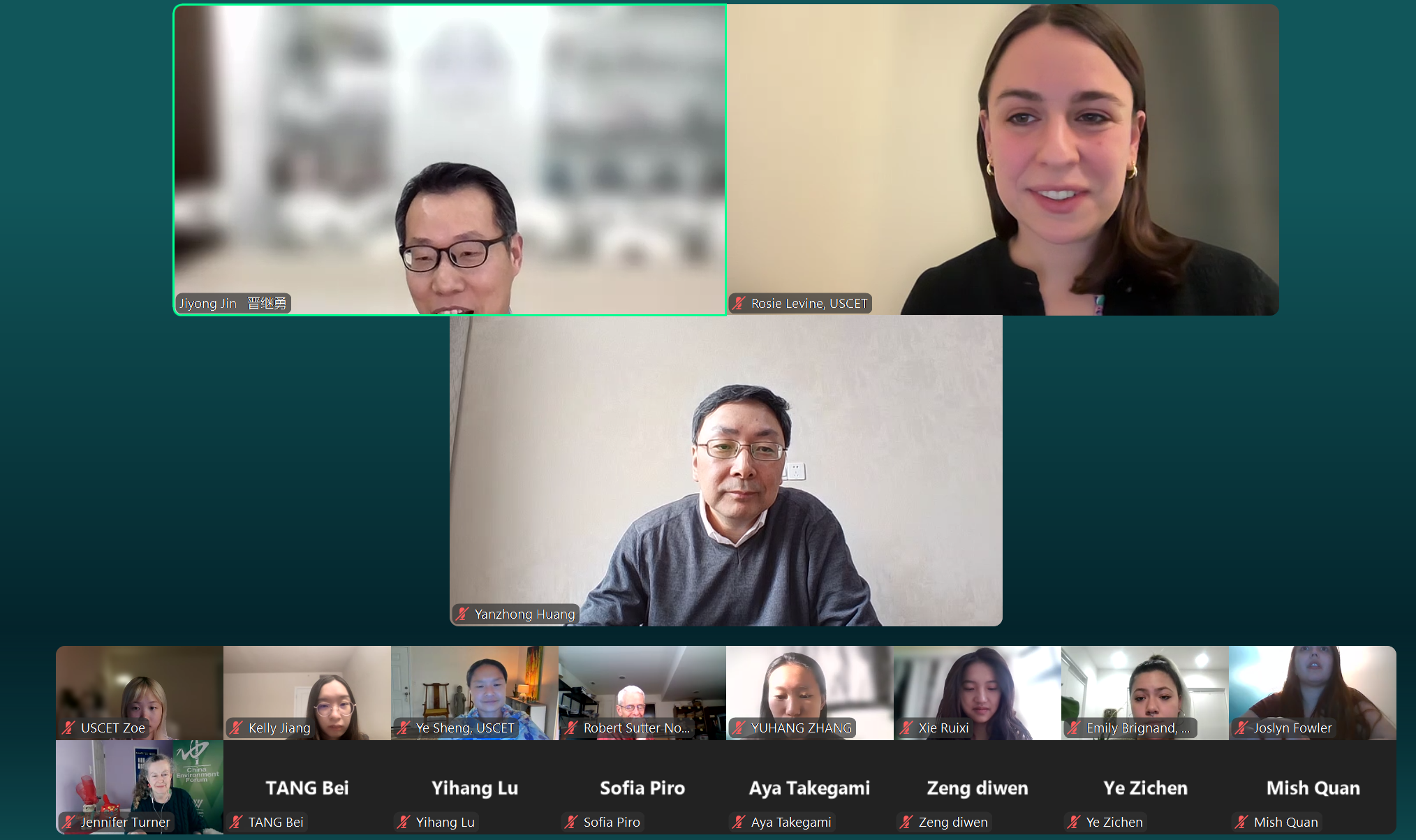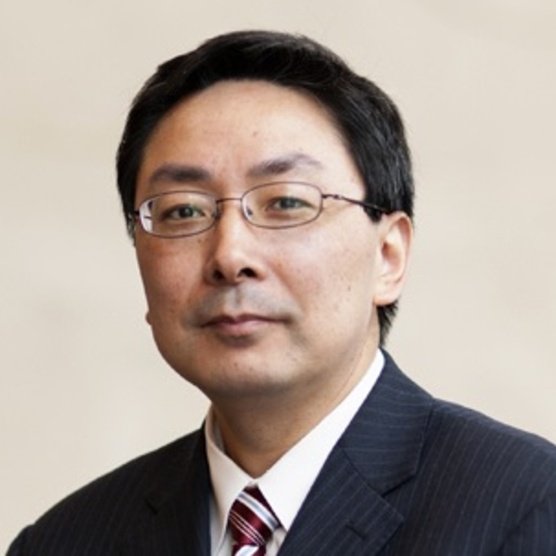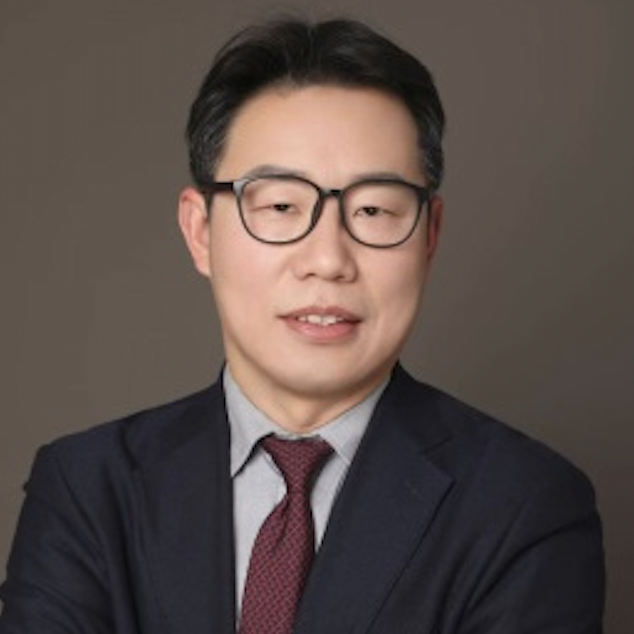
On March 28, USCET hosted its Students Finding Common Ground monthly virtual meeting, bringing together students, mentors, and advisors from the U.S. and China for an evening of open dialogue and cross-cultural learning. The March meeting featured two distinguished guest speakers from the field of public health: Dr. Yanzhong Huang, Senior Fellow for Global Health at the Council on Foreign Relations and Professor at Seton Hall University, and Dr. Jiyong Jin, Associate Professor and Deputy Dean at Shanghai International Studies University. The session was introduced and moderated by Rosie Levine, USCET’s Executive Director.
Both speakers shared insights on U.S.-China collaboration in global health, reflecting on their experiences building trust across borders. Dr. Huang drew from decades of experience in health policy, sharing lessons from navigating diplomatic tensions while engaging in meaningful cooperation on public health issues. He spoke about the role of informal and personal relationships in creating pathways for collaboration, particularly during moments of political complexity. His insights underlined the importance of open communication, mutual respect, and patience in building trust between counterparts from different national and institutional backgrounds. Speaking of the Students Finding Common Ground project, Dr. Huang encouraged students to exchange ideas with their advisors strategically to navigate institutional and cultural barriers that might otherwise create conflicts. He also suggested that students should set clear expectations and be comfortable about asking for clarification when working across language and cultural differences.
Dr. Jin offered a complementary perspective, focusing on the human dimensions of cross-cultural work. Drawing from his experience in U.S.-China academic cooperation, he emphasized empathy and active listening as essential tools for collaboration. Dr. Jin believed that it is more important than ever for the U.S. and China to promote intercultural communication, and the Students Finding Common Ground project is a vivid example of how people-to-people communication can contribute to trust-building among future generations. He encouraged students participating in exchange programs to remain open-minded about cultural differences, be passionate about their research topics, and actively communicate with local people to understand their perspectives.
Following the speakers’ remarks, Rosie led a moderated discussion exploring practical approaches to trust-building, communication, and teamwork in international contexts. Both speakers offered actionable suggestions for students currently working on group projects across cultures, such as aligning expectations early, showing cultural humility, and fostering curiosity rather than judgment. They also shared suggestions for students’ future careers, encouraging them to seek out experiences that challenge their assumptions and broaden their perspectives. Dr. Jin also advised students who are currently based in the U.S. to explore Chinese culture by learning the language, visiting Chinatowns, and participating in relevant research projects.
During the Q&A session, students posed thoughtful questions on a range of topics, from identifying the most suitable tasks for collaboration to pursuing an advanced degree in public health schools. The speakers welcomed these questions and engaged with them insightfully, encouraging students to be broad-minded about potential opportunities and think critically about their role in fostering cooperation during uncertain times.
The meeting closed with brief updates from each student group as they prepared for their final presentations in April. As always, the session emphasized the Students Finding Common Ground project’s core values: dialogue, understanding, and the power of collaboration. In an era of rising global uncertainty, this meeting served as a timely reminder of the importance of human connection in international relations—and the crucial role that younger generations can play in shaping a more cooperative future.
Speaker Biography

Dr. Yanzhong Huang is a senior fellow for global health at the Council on Foreign Relations, where he directs the Global Health Governance roundtable series. He is also a professor and director of global health studies at Seton Hall University’s School of Diplomacy and International Relations, where he developed the first academic concentration among U.S. professional international affairs schools that explicitly addresses the security and foreign policy aspects of health issues. He is the founding editor of Global Health Governance: The Scholarly Journal for the New Health Security Paradigm.

Dr. Jiyong Jin is a professor of Political Science and Deputy Dean of School of International Relations and Public Affairs, Shanghai International Studies University, China. His research focuses on global (health) governance and International organizations. He was awarded Oxford-Princeton Global Leaders Fellowship and worked as a Post-doctoral Research Associate at Princeton University and University of Oxford from 2011 to 2013 respectively. He was also awarded the Fox International Fellowship by Yale University and studied at Yale from 2008 to 2009. Prof. Jin is the author of International Regimes in Global Health Governance published by Routledge in 2021. His research papers on global health have been published by Health Security, Journal of Health Politics, Policy and Law, Foreign Affairs Review, China International Studies, etc.
